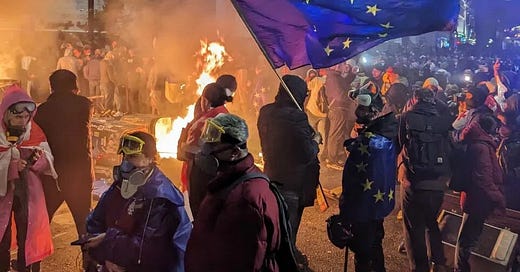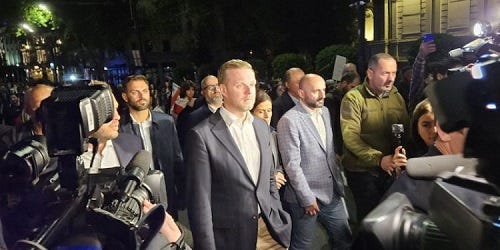Pretext for latest riot - prime minister suspends talks on joining EU until 2028
It was the EU, not Georgia, that suspended accession talks on Jul 9, 2024
The EU and U.S. also withheld promised aid BEFORE the Oct 26 election
Real objective: EU expansion and a new front against Russia
Foreign official suggests Georgia will resist for days, then resort to 'guerilla war'
Twist is NATO’s pivot to South Atlantic and Pacific - who will run Europe?
Related:
If They Coup Georgia, They Can Coup The USA - EurasiaNote 99 - U.S. and EU double standards on Tbilisi's election (Oct 29, 2024)
Censorship Is About Money And Power - Truth & Servitude Part 2. From propaganda to crackdown: follow the dosh (Apr 22, 2024)
Eurasia note #84: Georgia Warns U.S.-Backed Groups Plotting Unrest (Oct 04, 2023)
(2,200 words or about 11 minutes of your company)
Tbilisi, Nov 29, 2024
Georgia protests turned violent, after weeks of agit-prop in Tbilisi failed to bring down the government.
Rioters lit fires on Rustaveli Avenue after prime minister Irakli Kobakhidze announced that the government would delay negotiations with the European Union until the end of 2028.
Police responded with water cannon, tear gas, and pepper spray. One reporter said he was hit by a rubber bullet.
The accession talks were not active in any case — the EU had already suspended negotiations in July 2024.
Kobakhidze proposed a hiatus, accusing some of the bloc's politicians of “blackmail and manipulation.”
Narrative collides with reality. Georgia had frosty relations with Russia before most Europeans had heard of the Ukraine, and had obstacles to trade with Russia long before the European Commission imposed sanctions.
Thus the parade of coiffured European politicians taking selfies outside the parliament in Tbilisi is not only hypocritical but mendacious.
This article will update you on their real objectives, so far as we can divine.
Origins
Georgia has had rocky relations with Russia for years. They fought a brief war in 2008 (all Georgian parties call it an occupier of Abkhazia and South Ossetia).
Russia banned direct flights and imposed visa requirements in 2019 harming Georgia's economy and the hundred thousand Georgians who live in Russia (restrictions were lifted in May 2023).
Since the war in Ukraine, Georgia’s economy has become more integrated with Russia. Ukrainians and Russians fleeing the conflict live side by side in Georgia giving a boost to an economy heavily dependent on tourism.
That’s not what the Western analysts expected — and they don’t like it.
Find a hostile interpretation from RFL/RE and a counterpoint from the speaker of Georgia's parliament Shalva Papuashvili.
Continuum
The current protests focus on EU membership, the disclosure of foreign financing of profitable pressure groups (NGOs), and the election results.
The objective of joining the European Union and NATO are embedded in the constitution. However the speed at which Georgia joins, and whether it is accepted, depends on decision makers in Brussels — as much as the pace of reform in Tbilisi.
With Color Revolution ™ activists uncovered in Tbilisi and EU politicians rallying outside Georgia's parliament, the government had every reason to point at foreign interference.
In March foreign ministers of Latvia, Estonia, Iceland and Lithuania joined protesters on Rustaveli Avenue against the Transparency of Foreign Influence law.
If you detect a note of cynicism it is because the protests are cynical.
Entropy
The same foreign influencers criticised the Transparency of Foreign Influence law (an earlier version was withdrawn after Western protests in 2023).
They interfered in the election, and then they criticised the election results.
There are valid criticisms of Georgia's government — but being pro-Russian is possibly the weakest.
The main fissure in Georgia is between the mass of the population surviving in a dysfunctional economy and the administrative elite with foreign income — either from their overseas business or from "philanthropies" like the Soros foundations and Western government agencies like USAID.
The non-profits are two-faced. They are very profitable. They are hardly non-governmental. And they face both ways: towards their foreign funders, while seeking to influence policy and governance within Georgia.
He who pays the piper calls the tune.
Just weeks before the Oct 26 election the U.S. and EU withheld about $200 million in combined aid and imposed travel restrictions on Georgian Dream officials.
Georgian Dream won by a large margin, while observers found few violations. Foreign politicians say otherwise and have stepped up their presence on Tbilisi's streets.
Dissipation
What, therefore, are the protesters' and foreign politicians' real objectives? They are several:
The EU imperative of relentless expansion, impelled by the need to resolve internal contradictions. Georgia is part of what Brussels labels the "western Balkans."
The EU as bait, luring populations with the hope of sudden wealth, while drawing them into NATO's embrace.
The NATO-ists’ urge to resist Russian influence and to deny it any degree of reconciliation with its neighbours. The more extremist hope to open a second front against Russia which would last about four days.
Let's explore each of these in more detail.
Keep reading with a 7-day free trial
Subscribe to Moneycircus to keep reading this post and get 7 days of free access to the full post archives.




